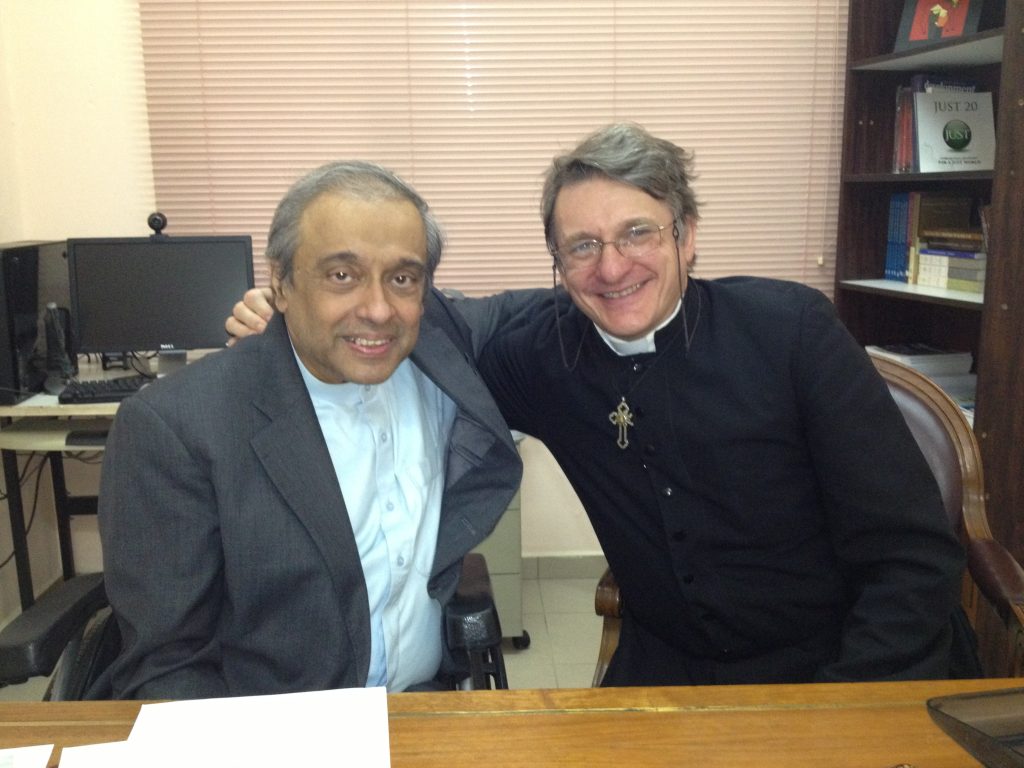
I reprint the following paper from my friend, Dr Chandra Muzaffar, with permission. It was first presented at Pax Christi’s fourth Asia Pacific Consultation held in Pattaya, Thailand from 24 to 26 September 2006.
CHRISTIANS AND MUSLIMS – AND THE CHALLENGE OF HEGEMONIC POWER
The importance of Christians and Muslims working together for the future cannot be emphasized enough. Apart from the fact that the two religious communities constitute more than half of humankind, some of the greatest threats to world peace and global stability involve groups and individuals who happen to be Christians and Muslims. My presentation will touch upon these groups and individuals.
In the Christian community, there are elements within the Christian Right who support Washington’s perpetration of war and violence in pursuit of its goal of a global empire. Thus their endorsement of the Iraq war in March 2003. They had also given their full support to Israel’s massive assault upon Lebanon in July 2006. These elements regard Washington’s hegemony over the Middle East as a necessary condition for Israel’s security and supremacy which in turn is vital for ‘the return of the Messiah’ – a return which in their reckoning would signal the universal triumph of Christianity. The Muslims who are the overwhelming majority in the Middle East are a stumbling block to this apocalyptic vision of the future and will therefore have to be subjugated or converted to Christianity. Of course, when the Messiah returns, according to certain aspects of Christian Right doctrine, the Jews will also be brought into the Christian fold – except that for the time being the Christian Right has decided to forge a tactical alliance with the Zionist Right in both Washington and Tel Aviv!
It is this link with the Zionist Right which has enhanced the influence of the Christian Right upon the ruling elite in Washington in recent years. The Christian Right itself, it should be acknowledged, has also become increasingly powerful in Washington since the ascendancy of President George W. Bush, himself a Christian Rightist. It began to wield political influence for the first time since the Second World War when another Christian Rightist, Ronald Reagan, was in the White House in the eighties. Since the Christian Right was undoubtedly the single most important factor in Bush’s re-election on 2 November 2004, one can expect this emergent force in American politics to play a critical role in US domestic and foreign policies in the next four years.
There are other powerful interests connected to oil and arms which are also seeking to re-shape the Middle East – a goal which is in line with the Christian Right’s own agenda. Even Washington’s larger, all encompassing goal of ensuring that neo-liberal capitalism remains the dominant global credo has the wholehearted support of the Christian Right, which has banished issues of social justice to the margins of society. And, like sections of the Christian community in the colonial epoch, elements in the Christian Right today, too, bear deep-seated prejudices against Islam and Muslims.
A fringe within the Muslim community has deliberately chosen to respond to Washington’s hegemony, and the Zionist Right and the Christian Right that are intertwined in this pattern of global power, by resorting to acts of mindless, senseless violence. This fringe, embodied in the vile and vicious politics of the likes of Osama bin Laden and the al-Qaeda, appears to have developed a constituency of sorts among the disenfranchised and disadvantaged segment of the community. By reacting to state terror with privatized terror, both the global hegemon and its allies, on the one hand, and militant Muslim groups, on the other, have made the world a much more dangerous place to live in.
As Muslim militants attempt to combat global hegemonic power in their own reckless manner, it is becoming clearer and clearer that they too desire to exercise dominance and control over other Muslims and humankind in general. Like the global hegemon, they too believe in the efficacy of violence in their quest for power. Like the Christian Right, they too subscribe to a Manichaean worldview, of good versus evil, of the people of faith (in their case, Muslims) pitted against the infidels. Their approach and worldview, in other words, are not dissimilar to that of their adversary. Both are inimical to peace and justice.
Confronted with this situation, peace-loving, justice-seeking Christians and Muslims have no choice but to take a clear, unambiguous stand against their respective co-religionists. They must be prepared to do battle against the hatred, bigotry and hegemonic attitudes of their fellow Christians and Muslims. At the same time, sincere, upright Christians and Muslims should join hands, hearts and heads in the noble struggle to create a just world which protects and enhances the dignity of each and every human life.
Christians, for instance, should not show any hesitation in opposing hegemony and imperial power. After all, Jesus (may peace be upon him) refused to yield to hegemonic political and religious power even though he was forced to pay the ultimate price for his unflinching faith in God and God’s goodness. This is why colonialism in the past, like hegemony in the present, constitutes a betrayal of Jesus’ powerful message of universal love and compassion. It follows from this that insofar as the Christian Right endorses hegemony and the war and violence that accompany it, it is making a mockery of Jesus’ teachings.
Similarly, Muslims should have no compunctions about condemning the violence and terrorism committed by the militant fringe within the community. It is morally repugnant to a religion whose principal source of guidance – the Noble Quran – gives so much emphasis to not only justice and equality but also to peace, mercy and compassion. Besides, a simplistic dichotomization of the world into Muslims and infidels is an affront to both the Quranic concept of the unity of the human family and the bond that it aspires to establish among all human beings through faith in God and the performance of good deeds.
Equally important, Christians and Muslims who are committed to peace founded upon justice should begin to transcend their religious affiliations and evolve a response to the imperial challenge rooted in their common humanity. While this has been happening within pockets of Christians and Muslims here and there, the majority within both communities have yet to move in this direction. It demands a transformation from exclusivist to inclusivist thinking on matters pertaining to religion. It calls for a metamorphosis from a deep attachment to a particularistic religious tradition to an all embracing devotion to a truly universal spiritual heritage. The rituals and symbols which distinguish a specific religious identity will have to be subordinated to those eternal values and principles of life which unite all women and men of faith, regardless of their formal religious affiliation. In a nutshell, a profound faith-based consciousness of our common humanity which has a transcendent love for God as its pivotal center, is only possible if we are prepared for a fundamental paradigm shift in our understanding of, and approach towards, religion.
Are we capable of such a paradigm shift? Some of the re-thinking that is taking place within the different religions today may lead to the transformation that we envisage. But the real impetus for change, I suspect, will come from outside religion. As more and more societies become heterogeneous in an increasingly globalized world, the reality of living cheek by jowl with the ‘religious other’ is bound to impact upon people’s perceptions of religions other than their own. Besides, since globalization has already penetrated geographical, economic and cultural barriers, there is no doubt at all that it will also eventually breach religious barricades.
More than anything else, it is perhaps the empire itself, in an ironical sense, that may ‘succeed’ in uniting Christians and Muslims and people of other faiths. If the empire continues its present arrogant drive to dominate and control the world through war and violence resulting in the perpetual slaughter of tens of thousands of human beings, we can expect millions and millions more people to come together to oppose Washington’s hegemonic global power. The mammoth worldwide protests against the Anglo-American war on Iraq in 2003 which united thousands of Christians and Muslims in a common cause gave us a glimpse of the potential for inter-faith solidarity.
The Lebanon War of 2006 was perhaps yet another example of inter-faith solidarity in action. The courageous resistance of the Lebanese people to Israeli aggression helped to forge Muslim-Christian solidarity in an unprecedented manner. It is not widely known that the mainly Shiite Muslim Hizbullah succeeded in reaching out to not only the Sunni Muslims but also to a significant segment of the Christian population. Even before the War, from the mid-nineties, Hizbullah’s leader, Sayyed Hassan Nasrallah, had developed fraternal ties with both religious and secular Christian leaders. Christians receive humanitarian assistance from the Hizbullah without any religious distinction. Christians are part of Hizbullah’s political wing just as a few Christians serve in its military operations. It explains to some extent why Hizbullah and Nasrallah are held in such high esteem not just by Lebanese Christians but also by Syrian Christians. Like their Muslim Arab compatriots, they view Hizbullah as a resistance movement – indisputably the strongest movement of its kind – which by standing up to Israeli aggression, and by extension, US hegemony, has restored the honor and dignity of the Arab masses.
This, then, is how Christian-Muslim solidarity will grow and develop in the future. It is through the sacrifice and suffering that any heroic struggle for justice demands, that Christians, Muslims and people from other backgrounds, will come together to create a compassionate civilization guided by values rooted in the Divine. This struggle, it is hoped, will be non-violent and peaceful – though it confronts an adversary which commands a formidable arsenal and has no compunctions about unleashing its hegemonic terror upon the innocent and the helpless.
Dr Chandra Muzaffar is President of the Internatinal Movement for a Just World (JUST)

